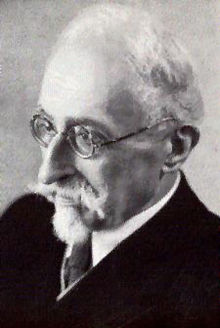Max Dessoir
| Max Dessoir | |
|---|---|
 |
|
| Born | 8 February 1867 |
| Died | 19 July 1947 (aged 80) |
| Occupation | Philosopher, psychologist, parapsychologist |
Max Dessoir (8 February 1867 – 19 July 1947) was a German philosopher, psychologist and theorist of aesthetics.
Dessoir was born in Berlin. He earned doctorates from the universities of Berlin (philosophy, 1889) and Würzburg (medicine, 1892). He was a professor at Berlin from 1897 until 1933, when the Nazis forbade him to teach.
An associate of Pierre Janet and Sigmund Freud, Dessoir published in 1890 a book on The Double Ego, describing the mind as divided into two layers, each with its own associative links - its own chain of memory. He considered that the 'underconsciousness' (Unterbewusstein) emerged in such phenomena as dreams, hypnosis, and dual personality. His work was built on by Otto Rank in his study of the Doppelgänger.
In an article of 1894, Dessoir published an account of the evolution of the sex instinct from undifferentiated to differentiated, which was taken up by Albert Moll and Sigmund Freud. Freud cites it approvingly in his Three Essays on the Theory of Sexuality.
Considered a Neo-Kantian philosopher Max Dessoir founded the Zeitschift für Ästhetik und allgemeine Kunstwissenschaft, which he edited for many years, and published the work Ästhetik und allgemeine Kunstwissenschaft in which he formulated five primary aesthetic forms: the beautiful, the sublime, the tragic, the ugly, and the comic.
He died in Königstein im Taunus.
In 1889, in an article in the German periodical Sphinx, Dessoir coined the term 'parapsychology' (actually in its German equivalent, 'Parapsychologie'): "If one ... characterizes by para- something going beyond or besides the ordinary, than one could perhaps call the phenomena that step outside the usual process of the inner life parapsychical, and the science dealing with them parapsychology. The word is not nice, yet in my opinion it has the advantage to denote a hitherto unknown fringe area between the average and the pathological states; however, more than the limited value of practical usefulness such neologisms do not demand."
...
Wikipedia
